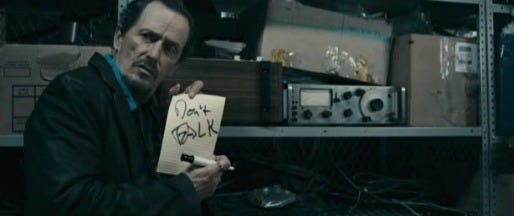No Sleep October: Pontypool (2009)
Atmosphere. Ignorance. The terror of not knowing everything.
Adapted from Tony Burgess's 1995 novel, “Pontypool Changes Everything,” “Pontypool” is about Grant Mazzy (Stephen McHattie), a radio host whose day takes a turn for the worst when a zombie virus starts spreading throughout his hometown of Pontypool.
Trapped in their studio by a blizzard, Mazzy and his assistants Sydney (Lisa Houle) and Laurel-Ann (Georgina Reilly) listen to the plague unfold via call-ins, police reports and their out-of-studio weatherman. As viewers, we never leave Mazzy, Sydney and Laurel-Ann. We know what they know as they know it. We watch them realize it's not just a hoax, that unimaginable danger awaits in the snowy white wastes just beyond their door.

“Pontypool” captures perfectly an aspect of zombie cinema that I've watched fall by the wayside in recent years. You see, I'm not entirely a horror movie novice. George A. Romero's “of the Dead” trilogy have been some of my favorite movies for as long as I've cultivated such lists. I remember the first time I watched “Night of the Living Dead” (mostly because I didn't sleep that night). It struck me as horrifying (beyond horrifying) not when I could see the zombies, but when I couldn't see them. The feeling of claustrophobia inside the house. “Dawn of the Dead” and “Day of the Dead” both manage to capture the same feeling inside malls and bunkers, respectively. "Pontypool" captures it with the radio station.
It seems to me that most modern zombie films have forgotten the importance of atmosphere. They focus instead on cathartic violence and libertarian "us-vs.-them" fantasy scenarios. From a horror perspective, that garbage is flat-out boring. I was overjoyed when watching “Pontypool” to see another zombie film successfully capture what I see as the terror of unseen danger, of forced ignorance. The danger is there, but you don't know enough to do anything about it. Watching characters slowly descend into madness at the mere awareness of a potential contagion in their mist is compelling. It's a pleasure to see it done right.
When you yell at the characters to double-bar their doors an hour before you actually see a zombie in the film, you're watching something special.
Another aspect of "Pontypool" I found rather refreshing was how they handled their zombie virus. See, in “Pontypool,” the zombie virus spreads through language, the spoken word. It infects a word within the mind and, through that word, breaks down the host's psyche until they're nothing but a gibbering and violent monster. While the weird pseudo-science sounds silly, it does a pretty decent job of creating a unique take on zombies.
By creating a definitive mechanism for the virus, and potential for curing it, “Pontypool” avoids turning its zombies into simple horde monsters to be slaughtered en masse. It also avoids descending into another endless-dystopia zombie fantasy.
"Pontypool" mixes a language virus with characters trapped in a radio station, whose only means of learning about the virus, or doing anything about it, relies on their ability to communicate verbally. How utterly brilliant is that?
I didn't lose any sleep over "Pontypool," but I'm damn glad to have watched it.


